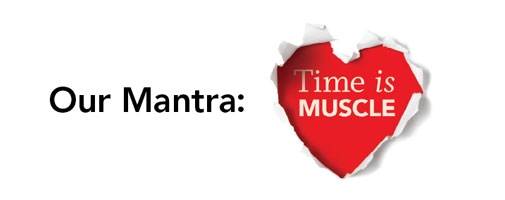Heart Attack Care: Call 9-1-1
Call 9-1-1 When Heart Attack is Suspected

When a Heart Attack Strikes, Every Second Counts
Acting quickly by calling 9-1-1 to get rapid care for a heart attack can save lives.
According to the National Heart, Lung, and Blood Institute, more than 1 million Americans suffer a heart attack each year; of those, 460,000 are fatal, and half of those deaths occur within one hour of the start of symptoms and before the person reaches the hospital.
“Fortunately, you can protect your heart by calling 9-1-1 as soon as you have symptoms,” says Joe Nunes, senior director of Cardiovascular Services at St. John’s. “Call even if you are not sure you’re having a heart attack.”
All of the following can be signs of a heart attack:
- chest discomfort, pressure, tightness
- squeezing that spreads through the chest and/or radiates to other areas of the body
- shortness of breath
- nausea, vomiting, belching
- sweating
- palpitations
- lightheadedness
- unusual fatigue
- fainting
- pain or discomfort in the center of the chest (for women)
“A heart attack, also known as a myocardial infarction [MI], occurs when the blood supply to an area of the heart is cut off as a result of a blockage of one or more of the coronary arteries,” says Alejandro Garcia, M.D., medical director of Cardiology at St. John’s. “This process occurs when cholesterol plaque that has deposited within the arteries of the heart suddenly becomes disrupted and forms a blood clot. The combination of the cholesterol plaque and the newly formed blood clot completely block the coronary artery, resulting in a heart attack. The faster a heart attack patient is treated, the lower their risk is of heart muscle damage or death. This is why it’s so important that patients not delay in seeking care.”
Special Care for Urgent Heart Attacks
By calling 9-1-1, you ensure that you receive the right treatment for the type of heart attack you are having. “If, during an MI, an artery becomes completely blocked and the damage involves the full thickness of the heart muscle, the resulting life-threatening condition is known as an ST elevation MI, or STEMI,” explains Dr. Garcia. The treatment for a STEMI is different from that for other types of heart attacks. As a result, it is extremely important to be taken via ambulance to a hospital that has been designated as a STEMI receiving center, where a STEMI can be treated within 90 minutes or less, as American College of Cardiology and American Heart Association guidelines suggest.
St. John’s Regional Medical Center is a designated STEMI receiving center in Ventura County, which means heart attack patients who come through our doors always get prompt, leading-edge treatment. “Our team of experienced heart specialists are all dedicated to providing highly specialized care and responding to a STEMI within 90 minutes or less, from the time the patient comes into the emergency room to the time the blocked artery is opened,” says Nunes.
“Our experts have access to three state-of-the-art catheterization laboratories, where the latest and most effective minimally invasive heart procedures can be performed within those precious minutes that make the difference between life and death, and full or partial recovery,” notes Dr. Garcia.
Dial, Don’t Drive
If you think you or a loved one is having a heart attack, the best way to ensure you are taken to a STEMI receiving center is by calling 9-1-1 for an ambulance. Avoid driving yourself to the hospital as this may delay lifesaving measures. “Emergency medical personnel can begin treatment in the ambulance,” says Nunes.
For highly specialized heart care and lifesaving treatments when precious moments count, think of St. John’s.
Back to Heart and Vascular Institute Home Page.
Back to Emergency Services Page.
